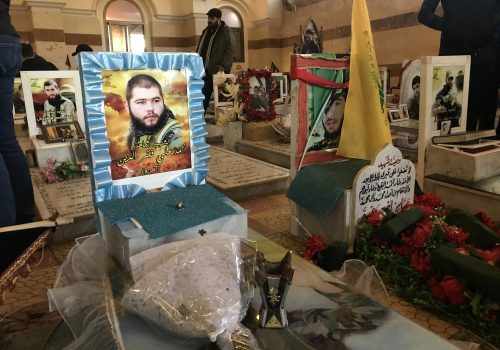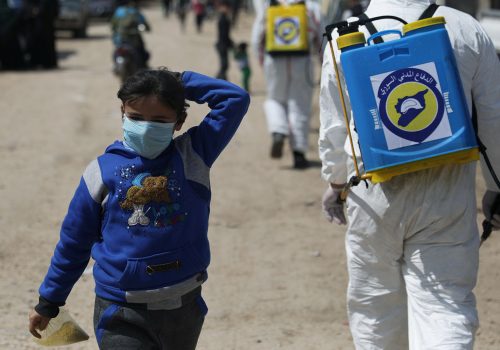I survived Assad’s torture—here’s why I’m a proud advocate of the Caesar Act
In almost a decade since the beginning of the 2011 Syrian uprising, over twelve million people have been displaced, well over half a million are dead, and hundreds of thousands languish in the Bashar al-Assad regime’s torture dungeons. In Idlib governorate in northwest Syria, four million people—mostly internally displaced persons (IDP)—are stuck in an ever-shrinking space where they are targeted by the regime’s military, Iranian and Iran-backed militias, and the Russian air force. In northeast Syria and southern Syria’s Rukban IDP camp, Syrians live in constant fear of the United States-led Coalition forces leaving—the only entity keeping them safe from Assad’s security forces. Regime-controlled areas are suffering from poverty and an unmitigated outbreak of COVID-19, and remain under the mercy of a corrupt political elite that lives in wealth while even their supporters suffer.
Over the last ten years, the international community, including the United States, largely stood by and watched as a never again moment unfolded in Syria. The Caesar Syria Civilian Protection Act of 2019, which sanctions regime officials and supporters, including those involved in corrupt reconstruction efforts, is the only major piece of US legislation to date focused on addressing the humanitarian crisis and ongoing war crimes in Syria. This law is by no means a silver bullet, but it is the very least the US can do while Assad and his allies continue to kill my people and destroy my country.
Despite the levelling of over fifty percent of Syria’s major cities, the targeting of countless hospitals, the destruction of at least nine thousand industrial facilities, and the obliteration of the Syrian public health sector, the Assad regime continues to dedicate its resources to the ongoing military campaign against civilians. Instead of buying food or medicine, the regime continues to purchase Russian weapons to fuel Assad’s machinery of death. After destroying the homes of millions of Syrians and displacing them all over the world, the regime confiscates their properties and arrests many of the refugees that dare return to what’s left of Syria. Aiming to garner diplomatic recognition, the criminal regime offers lucrative reconstruction contracts to foreign companies from countries in Asia, Europe, and the Middle East to build over the destroyed homes of millions that yearn to go home—many like the surviving members of my family.
I wanted to write this to share some of my story as a proud advocate of the Caesar Act. I was detained in 2012 as a minor merely for peacefully asking for freedom alongside my cousins Bashir, Rashad, and Nour in our home province of Tartus. Under torture, we were forced to give false confessions that we carried weapons and had killed officers with them, even though we never did. Despite the false confessions, my young cousins were tortured to death, including Bashir—my cousin and best friend who died in my arms in Assad’s torture dungeons.
One day, they arrested another cousin who ended up in the same cell I was in. He carried news from Al-Bayda, the village where I left behind all of my loved ones. My excitement upon seeing a familiar face with news quickly turned to a mixture of grief, anger, and shock. I learned that regime forces had murdered my father and two brothers in a massacre where hundreds of my relatives and friends had been slaughtered and burned. After enduring about three years of physical and psychological torture, a miracle allowed me to escape, and I was smuggled to Turkey where I reunited with my mother, who thought me dead (and I thought her dead) and called me her “newborn son.”
Today, I’m proud to be a voice for the hundreds of thousands of voiceless men, women, and children that continue to die slowly in Assad’s death camps. As the Director of Detainee Affairs for the Syrian Emergency Task Force, an American organization that supports the Syrian people’s demand for freedom and democracy, I have worked alongside passionate advocates to raise awareness about the atrocities unfolding in Syria. For years, my colleagues and I worked alongside the defector known widely by the pseudonym “Caesar” to conduct countless meetings with Republicans and Democrats in the House and Senate in pursuit of legislation that protects civilians and holds war criminals accountable.
One of our main priorities in working on the Caesar Act was to ensure that the legislation contained the most stringent humanitarian exceptions, while prioritizing the targeting of those that are enriching themselves from the suffering of Syrian civilians. This past March, I testified before the Senate Foreign Relations Committee alongside Caesar, calling for the full implementation of the Act because we understood that it not only sanctions criminals, but also calls for increased humanitarian aid, supports accountability, and demands a political solution.
It is infuriating to see the Assad regime blaming its own economic failures on the Caesar Act, but what has been more disappointing is how many people both inside and outside of Syria have subscribed to the regime’s misinformation. It is the corrupt regime leadership made up of war criminals that are targeted by this Act and want to get rid of it in order to commit more crimes against humanity. I want everyone to know that the Syrian pound was plummeting before the Caesar Act was implemented and that Syrian civilians would be suffering just as much, if not more, if the law didn’t exist.
The Caesar Act does not prevent the Assad regime from buying food or medicine, but it does go after the importation of anything that can be used to kill civilians. The law doesn’t target Syrian civilians regardless of their political affiliations but does prevent companies and individuals from rebuilding on homes that were destroyed and robbed from their displaced owners. Asma al-Assad, the wealthy wife of Bashar, and the Damascus Cham Holding Company, which helps the regime appropriate the land and property of displaced Syrian civilians, are among those who are sanctioned. All the regime needs to do to stop the Caesar sanctions is simply release the hundreds of thousands of innocent men, women, and children in detention, end the targeting and killing of civilians, and allow for the safe return of refugees to their homes.
When Caesar and I testified before the Senate Foreign Relations Committee on March 11, we were surrounded by the photographs of innocent souls whose bodies I numbered as a detainee and Caesar took photos of. We sat before the representatives of the American people in order to remind them that we cannot sit by as innocents are slaughtered. This act is a US law, but it is a response to the call of the Syrian people, including Caesar, myself, and the thousands of others screaming in the darkness. The Caesar Act has been the most powerful response to the crisis in Syria by the representatives of the American people and, yet, the very least they could have done in solidarity with Syrians yearning for freedom and democracy. The Caesar Act is not the solution, but an important tool that the US and the international community must use alongside others to end the killing in my homeland.
Omar Alshogre is the Director of Detainee Affairs at the Syrian Emergency Task Force. Follow him on Twitter: @omarAlshogre.
Sign up for all the latest updates!
Sign up for the MENASource newsletter, highlighting pieces that follow democratic transitions and economic changes throughout the region.
Image: Amal Ibrahim, 57, shows a picture of one of her sons, Mohammad, as she poses in the rebel held Kafrouma village in the southern countryside of Idlib, Syria, March 20, 2016. Her two sons were detained by authorities in the northern Syrian province of Idlib. She says she was told that one of them, Abdullah, died from torture after he was detained in Maaret al-Numan. She has not heard any news about her other son, Mohammad, who was detained in Khan Sheikhoun. Mother's Day in Syria is celebrated on March 21. Picture taken March 20, 2016. REUTERS/Khalil Ashawi


